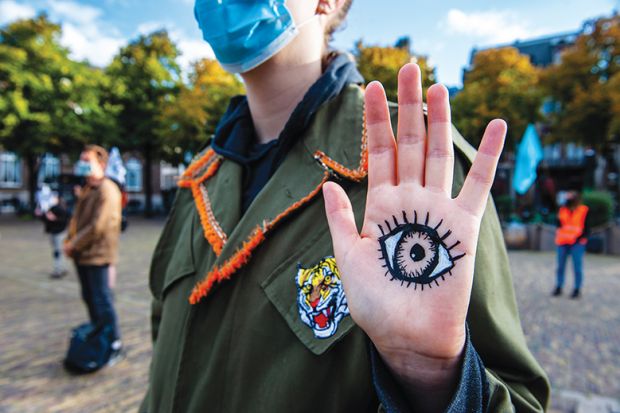Dutch academics have been hit by a wave of harassment from an anonymous group targeting public figures on the left, with one prominent historian coming home to find a poster stuck to her house warning that she was being watched.
Although online intimidation and threats are now a depressing fact of life for many politically active scholars worldwide, academics in the Netherlands are beginning to see the threat creep into the physical world.
“Coming to people’s doors, that is beyond anything [that’s happened before],” said Nadia Bouras, a specialist in Moroccan immigration to the Netherlands at Leiden University who is also a regular fixture in Dutch debates about migration.
Returning from a Sunday walk with her husband and children in late March, she found a poster from the group Vizier Op Links (Sights on the Left) stuck near her door which said: “This location is being watched.”
“I immediately was shocked, because I knew that sticker was for me,” she said. “I was shaking. But I didn’t want to show that to my kids.”
Professor Bouras decided to publicise the incident on Twitter, prompting other public figures to come forward and reveal they had also been targeted by the posters.
This is only the most brazen form of intimidation perpetrated by the group over the past year. About a week earlier, a popular historian, Geert Mak, had pictures of his home released by the group after delivering a televised historical lecture that warned of the dangers of modern-day fascism.
“The threats are much more common,” said Mr Mak. “Slowly it comes to the edge of physical violence.”
“Angry people” online threatened to go to his home, he said, but fortunately had not materialised in person.
The irony, he said, was that his lecture – which focused on the 1941 strike in occupied Amsterdam in defence of Dutch Jews – had also contained warnings against “left-wing cancel culture” and “crying wolf” by equating scepticism about migration with racism – when in fact “the wolf is standing in front of us”.
The risk was that historians would “think twice” before raising their heads in public, Mr Mak said.
Sights on the Left has also posted pictures on Twitter of the daughters of another outspoken migration academic, Leo Lucassen, who is also based at Leiden.
The harassment coincides with a surge in popularity for Forum for Democracy, a new radical right party whose leader, Thierry Baudet – himself a former Leiden law lecturer – has created a “hotline” to report supposed left-wing “indoctrination” by university lecturers, and claimed that Dutch civilisation is being “undermined” by universities and journalists.
March’s general election was on the whole a victory for the status quo, with the ruling conservative party winning the most seats.
Forum for Democracy, however, quadrupled its seats, attracting 5 per cent of the vote.
There is no formal link between Sights on the Left and the party, but the group has targeted activists it says have threatened Mr Baudet.
“This is not just some loser who decided to come to my door,” said Professor Bouras. “It stems from a political ideology. That makes it more scary.
“They stem from this political ideology that attacks especially university lecturers, but also high school teachers, who supposedly indoctrinate their students.”
Professor Bouras has filed a complaint about harassment, and police are now looking into the incident, she said.
Sights on the Left openly solicits Bitcoin donations on its website to fund posters and stickers. It has sought to dodge blame by saying that it is not responsible for how supporters use them, and continues to attack its targets through Twitter.
“Still Twitter doesn’t do anything about it,” said Professor Bouras. “Their account is still active.”
A spokeswoman for Twitter told Times Higher Education that the account was not in violation of the platform’s rules. “If we identify accounts or content that violate these rules, we’ll take enforcement action,” she said in a statement.
This kind of harassment was now “just the price of being outspoken”, said Professor Bouras. “What we can change is taking this very seriously, and universities should protect their employees.”
Leiden had “set an example” after the poster was discovered, she said, with the university’s security department immediately informing the police, and Leiden’s rector calling to offer support.
“They were immediately very vocal online against this type of intimidation,” she said.
A host of other national academic bodies also offered the historian support, as did the country’s minister of education, culture and science.
In the past, universities “were never that vocal in their opposition”, Professor Bouras said – but with this new escalation of harassment, that had changed.
后记
Print headline: ‘Anti-left’ group targets Dutch academics at home




